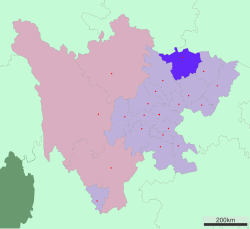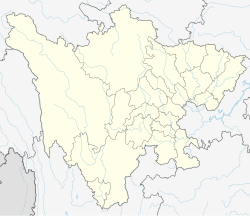Guangyuan (simplified Chinese: 广元; traditional Chinese: 廣元; pinyin: Guǎngyuán; Wade–Giles: Kuang-yüan) is a prefecture-level city in Sichuan Province, China, bordering the provinces of Shaanxi to the northeast and Gansu to the northwest. The city has a population of 2,305,657 as of the 2020 census.[2]
Guangyuan
广元市 | |
|---|---|
 | |
 Location of Guangyuan in Sichuan | |
| Coordinates (Guangyuan municipal government): 32°26′10″N 105°50′38″E / 32.436°N 105.844°E | |
| Country | People's Republic of China |
| Province | Sichuan |
| Municipal seat | Lizhou District |
| Area | |
| • Total | 16,313.78 km2 (6,298.79 sq mi) |
| Population (2020) | |
| • Total | 2,305,657 |
| • Density | 140/km2 (370/sq mi) |
| GDP[1] | |
| • Total | CN¥ 60.5 billion US$ 9.7 billion |
| • Per capita | CN¥ 23,263 US$ 3,735 |
| Time zone | UTC+8 (China Standard) |
| Postal code | 628017 |
| Area code | 0839 |
| ISO 3166 code | CN-SC-08 |
| Website | www |
Located roughly between the provincial capitals Chengdu, Lanzhou, Xi'an and Chongqing municipality, it is considered the northern gateway to Sichuan.[3] It is an ancient city, notable for its relics and tombs.
History
editFormerly known as Lizhou (利州, or Li prefecture), Guangyuan was the birthplace of Wu Zetian, the only woman in Chinese history to rule directly as emperor.[4]
On 12 May 2008, a magnitude 7.9 earthquake occurred. 4,822 people were killed, 28,245 injured, and 125 missing in the city as of 7 June 2008.[5]
Economy
editGuangyuan's economy is based on a diverse array of heavy industry, as well as mining and agriculture.[citation needed] Plant 821, a former large plutonium producing reactor, now used to process nuclear waste, is located near Guangyuan.[6] The city is an important production center for traditional Chinese medicine.[7]
Administrative divisions
edit| Map | |||||
|---|---|---|---|---|---|
| Name | Hanzi | Hanyu Pinyin | Population (2010) | Area (km²) | Density (/km²) |
| Lizhou District | 利州区 | Lìzhōu Qū | 516,424 | 1,482 | 348 |
| Zhaohua District | 昭化区 | Zhāohuà Qū | 168,489 | 1,435 | 117 |
| Chaotian District | 朝天区 | Cháotiān Qū | 174,333 | 1,618 | 108 |
| Wangcang County | 旺苍县 | Wàngcāng Xiàn | 385,787 | 2,976 | 130 |
| Qingchuan County | 青川县 | Qīngchuān Xiàn | 222,253 | 3,269 | 68 |
| Jiange County | 剑阁县 | Jiàngé Xiàn | 457,656 | 3,204 | 142 |
| Cangxi County | 苍溪县 | Cāngxī Xiàn | 559,181 | 2,330 | 240 |
Climate
edit| Climate data for Guangyuan, elevation 545 m (1,788 ft), (1991–2014 normals, extremes 1981–2010) | |||||||||||||
|---|---|---|---|---|---|---|---|---|---|---|---|---|---|
| Month | Jan | Feb | Mar | Apr | May | Jun | Jul | Aug | Sep | Oct | Nov | Dec | Year |
| Record high °C (°F) | 19.5 (67.1) |
26.0 (78.8) |
30.4 (86.7) |
34.4 (93.9) |
36.8 (98.2) |
38.7 (101.7) |
40.5 (104.9) |
37.7 (99.9) |
36.6 (97.9) |
31.0 (87.8) |
26.3 (79.3) |
19.2 (66.6) |
40.5 (104.9) |
| Mean daily maximum °C (°F) | 9.6 (49.3) |
12.4 (54.3) |
17.4 (63.3) |
23.4 (74.1) |
27.4 (81.3) |
30.1 (86.2) |
31.5 (88.7) |
31.2 (88.2) |
26.2 (79.2) |
21.2 (70.2) |
16.2 (61.2) |
10.8 (51.4) |
21.4 (70.6) |
| Daily mean °C (°F) | 5.4 (41.7) |
8.1 (46.6) |
12.3 (54.1) |
17.6 (63.7) |
21.7 (71.1) |
24.8 (76.6) |
26.5 (79.7) |
26.0 (78.8) |
21.6 (70.9) |
16.8 (62.2) |
11.8 (53.2) |
6.8 (44.2) |
16.6 (61.9) |
| Mean daily minimum °C (°F) | 2.4 (36.3) |
5.0 (41.0) |
8.5 (47.3) |
13.3 (55.9) |
17.2 (63.0) |
20.6 (69.1) |
22.8 (73.0) |
22.3 (72.1) |
18.6 (65.5) |
14.1 (57.4) |
8.7 (47.7) |
3.9 (39.0) |
13.1 (55.6) |
| Record low °C (°F) | −4.5 (23.9) |
−2.9 (26.8) |
−3.2 (26.2) |
2.7 (36.9) |
8.3 (46.9) |
14.5 (58.1) |
16.0 (60.8) |
15.0 (59.0) |
11.7 (53.1) |
1.7 (35.1) |
−0.8 (30.6) |
−5.7 (21.7) |
−5.7 (21.7) |
| Average precipitation mm (inches) | 4.7 (0.19) |
9.3 (0.37) |
17.5 (0.69) |
49.2 (1.94) |
90.5 (3.56) |
124.5 (4.90) |
247.1 (9.73) |
147.4 (5.80) |
138.0 (5.43) |
57.0 (2.24) |
19.3 (0.76) |
4.2 (0.17) |
908.7 (35.78) |
| Average precipitation days (≥ 0.1 mm) | 4.3 | 5.1 | 7.3 | 10.0 | 12.0 | 12.1 | 14.6 | 13.2 | 13.5 | 12.3 | 6.6 | 4.0 | 115 |
| Average snowy days | 2.5 | 1.0 | 0.2 | 0.1 | 0 | 0 | 0 | 0 | 0 | 0 | 0.2 | 0.8 | 4.8 |
| Average relative humidity (%) | 63 | 63 | 61 | 62 | 62 | 68 | 74 | 74 | 76 | 75 | 70 | 66 | 68 |
| Mean monthly sunshine hours | 71.4 | 68.4 | 98.5 | 132.3 | 147.7 | 133.1 | 140.2 | 155.1 | 86.7 | 79.4 | 78.0 | 76.1 | 1,266.9 |
| Percent possible sunshine | 22 | 22 | 26 | 34 | 34 | 31 | 32 | 38 | 24 | 23 | 25 | 25 | 28 |
| Source: China Meteorological Administration[8][9] | |||||||||||||
Transport
editLocated roughly between the provincial capitals Chengdu, Chongqing, Lanzhou, Xi'an, Guangyuan is an important traffic hub in northern Sichuan.[10] The city has a port on the Jialing River, which is the closest inland port to Northwest China, and navigable all the way the east coast.
- China National Highway 212
- G5 Beijing–Kunming Expressway
- G5012 Enguang Expressway
- G75 Lanzhou–Haikou Expressway
- Baoji–Chengdu railway (part of the main route from Chengdu to Xi'an and Beijing)
- Xi'an–Chengdu high-speed railway (completed in December 2017)
- Lanzhou–Chongqing high-speed railway
- Guangyuan Panlong Airport
Cuisine
editGuangyuan is known for Wangcang noodles.[11]
References
edit- ^ 四川省统计局、国家统计局四川调查总队 (2016). 《四川统计年鉴-2016》. 中国统计出版社. ISBN 978-7-5037-7871-1.
- ^ "广元市第七次全国人口普查公报". 17 June 2021.
- ^ Chris Parker. "Guangyuan--An up and coming tourist destination".
- ^ "Welcome to Guangyuan". Lonely Planet.
- ^ "Guangyuan Government Held 20th News Conference for the Earthquake on June 7" (in Chinese (China)). Official website of Guangyuan Government. 8 June 2008. Archived from the original on 20 June 2017. Retrieved 8 June 2008.
- ^ "广元821核军工厂的昨天与今天". xw.qq.com (in Chinese). Retrieved 1 December 2021.
- ^ "New Material Industry". The People's Government of Guangyuan.
- ^ 中国气象数据网 – WeatherBk Data (in Simplified Chinese). China Meteorological Administration. Retrieved 14 April 2023.
- ^ 中国气象数据网 (in Simplified Chinese). China Meteorological Administration. Retrieved 14 April 2023.
- ^ "Endowed City Next To Shu Path".
- ^ "旺苍手工挂面-利州区人民政府". www.lzq.gov.cn. Retrieved 6 February 2021.
